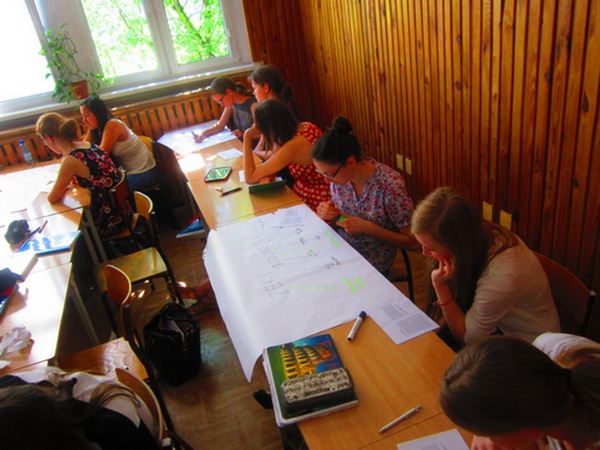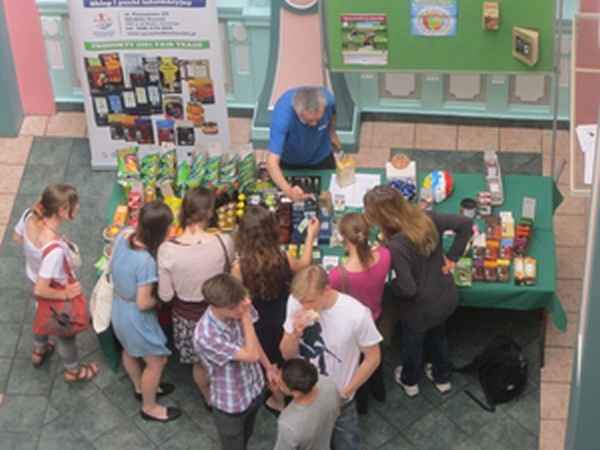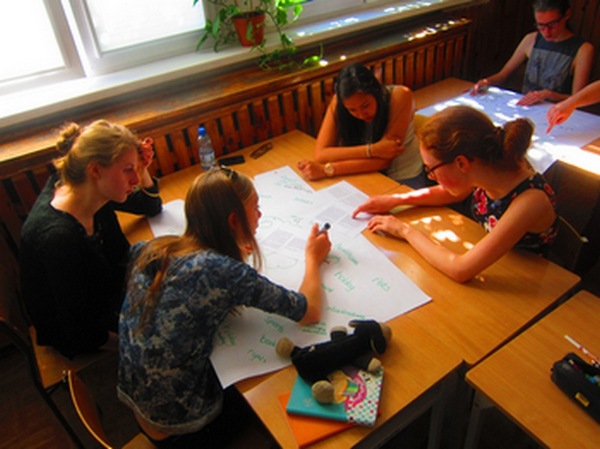

Well, well, well...It's finally over. I'm sure I'll never forget this school year. Although it was not as tough as I'd been said it would be, it really tired me out... Read more
I don't think many of you have hear about our amateur school theatre "Earnest" before, but this year you had a chance to not only hear about it, but catch in "in the act". Its actors have been working hard the whole year to stage "The Glass Menagerie", and fortunately they succeeded! Read more
Latest articles:
The Ivory Coast, a small coca farm. 8-year old Hussein just as 1.8 million of children under 18, has to work the whole day in hazardous conditions. He gets no pay, even though he puts his health in jeopardy being exposed to... Read more
Fair Trade
The Ivory Coast, a small coca farm. 8-year old Hussein just as 1.8 million of children under 18, has to work the whole day in hazardous conditions. He gets no pay, even though he puts his health in jeopardy being exposed to harmful pesticides, and using a machete. The worst part is that he was tricked to think that he will get paid and that he works to help support his family.
The Ivory Coast, a small coca farm. 8-year old Hussein just as 1.8 million of children under 18, has to work the whole day in hazardous conditions. He gets no pay, even though he puts his health in jeopardy being exposed to harmful pesticides, and using a machete. The worst part is that he was tricked to think that he will get paid and that he works to help support his family.

This website is created with WYSIWYG Web Builder from http://www.pablosoftwaresolutions.com
website design by Stanis�aw Kabaci�ski
website design by Stanis�aw Kabaci�ski
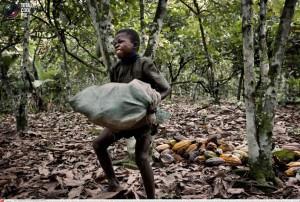
Photo from: http://www.ethicalliving.co.za/guilty-pleasure-slavery-and-child-labour-in-the-production-of-chocolate/
Kenya, Julius Ethang'atha's tea plantation. In Michimukru, so where Julius lives, he is a well-respected figure of a retired tea producer. He fought the poor conditions, with the help of Fair Trade Organization. Looking back, he says: It wasn't easy to become certified, but I saw it was the best way out for our people. There was a huge impact on the first communities to work with Fairtrade. They were poor communities; they did not have water, dispensaries or schools close to them. The money they got from tea was used for food and clothes, but now they also get a premium that they can use to improve their social living. So far they have set up impressive schools and daycare centres, dispensaries, maternity units, water systems, bridges and roads. Even though Fair Trade gets as much criticism as it gets support, Julius disapproves of such an attitude: You see, the farmer receives just 5% of the wealth in tea. When the consumer pays more for Fairtrade tea, this extra money goes to the farmer and improves lives. But if the whole value chain was made fairer, Africa would be lifted out of poverty.
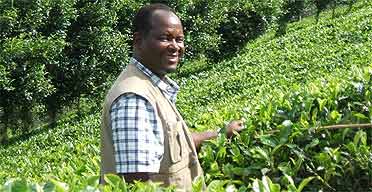
Photo and quotes from: http://www.theguardian.com/environment/2008/mar/12/ethicalliving.lifeandhealth
Fair Trade is an organization known all around the world, fighting with poverty, hazardous conditions of work, and child labour. To put the matter simply: they fight for human dignity for poor producers.
Fair trade's ideas are getting more and more popular, and even though the organization is unable to help every single farmer, it acts upon reaching the poorest and actually making a difference.
What is most important, it helps the farmers to stand on their own feet rather than provide for them. They do not only ensure higher wages and better working conditions, or fight against discrimination and child labour. Fair trade supports building schools, introducing new technologies, investing in health, medication as well as building hospitals. They also get a special premium, about which the small communities of producers can decide how it should be spent, and what is most important for them.
The noble ideas of Fair Trade were also supported by our school, which is trying to become the first public Fair Trade School in Poland, a school actively engaged in helping the poor. On the 22nd of May, Professor El�bieta Koralewska with the help of the students organized the second Fair Trade Day in our school. It was not the first venture, as from the very beginning of this school year they worked upon popularizing the idea, and putting it on everyone's mouth. The main aim was to inform about and promote the project. As it often happens, people do not realize how unfairly the producers are treated, how little of what we pay goes directly to them, and how every fluctuation of the price of the commodities they produce may be a sentence for them. The issue, though serious, was presented in a more optimistic manner. Rather than on the cruelty, the focus was put on the solutions, as it is important to know what can actually be done. All around the school there were posters about Fair Trade people and products. There was a special exhibition in the library, presenting all the books and materials on Fair Trade and the poorest of producers from Africa or South America available in our school. Leaflets were distributed to the students, and there was also a little shop, where our students could buy some Fair Trade products. Also, an economics lesson was devoted to the idea of Fair Trade.
Hopefully, the Fair Trade Day, as well as all other action undertaken by our Professor and students have made a difference in people's minds and that now, more aware of their powers as consumers, the students will bring the ideology into life.
The Fair Trade Day was a nice occasion to sum up all these year's activities. Though a lot has been done, there is still more to come, and we do hope that our Professor and the students will work just as eagerly to promote the idea next year!
Fair trade's ideas are getting more and more popular, and even though the organization is unable to help every single farmer, it acts upon reaching the poorest and actually making a difference.
What is most important, it helps the farmers to stand on their own feet rather than provide for them. They do not only ensure higher wages and better working conditions, or fight against discrimination and child labour. Fair trade supports building schools, introducing new technologies, investing in health, medication as well as building hospitals. They also get a special premium, about which the small communities of producers can decide how it should be spent, and what is most important for them.
The noble ideas of Fair Trade were also supported by our school, which is trying to become the first public Fair Trade School in Poland, a school actively engaged in helping the poor. On the 22nd of May, Professor El�bieta Koralewska with the help of the students organized the second Fair Trade Day in our school. It was not the first venture, as from the very beginning of this school year they worked upon popularizing the idea, and putting it on everyone's mouth. The main aim was to inform about and promote the project. As it often happens, people do not realize how unfairly the producers are treated, how little of what we pay goes directly to them, and how every fluctuation of the price of the commodities they produce may be a sentence for them. The issue, though serious, was presented in a more optimistic manner. Rather than on the cruelty, the focus was put on the solutions, as it is important to know what can actually be done. All around the school there were posters about Fair Trade people and products. There was a special exhibition in the library, presenting all the books and materials on Fair Trade and the poorest of producers from Africa or South America available in our school. Leaflets were distributed to the students, and there was also a little shop, where our students could buy some Fair Trade products. Also, an economics lesson was devoted to the idea of Fair Trade.
Hopefully, the Fair Trade Day, as well as all other action undertaken by our Professor and students have made a difference in people's minds and that now, more aware of their powers as consumers, the students will bring the ideology into life.
The Fair Trade Day was a nice occasion to sum up all these year's activities. Though a lot has been done, there is still more to come, and we do hope that our Professor and the students will work just as eagerly to promote the idea next year!

